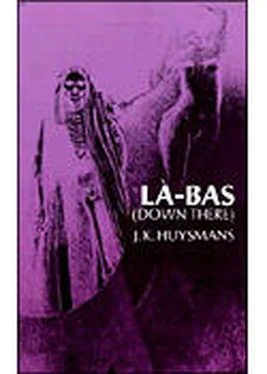Joris-Karl Huysmans - Down There (Là-Bas)
Здесь есть возможность читать онлайн «Joris-Karl Huysmans - Down There (Là-Bas)» весь текст электронной книги совершенно бесплатно (целиком полную версию без сокращений). В некоторых случаях можно слушать аудио, скачать через торрент в формате fb2 и присутствует краткое содержание. Жанр: Классическая проза, на английском языке. Описание произведения, (предисловие) а так же отзывы посетителей доступны на портале библиотеки ЛибКат.
- Название:Down There (Là-Bas)
- Автор:
- Жанр:
- Год:неизвестен
- ISBN:нет данных
- Рейтинг книги:3 / 5. Голосов: 1
-
Избранное:Добавить в избранное
- Отзывы:
-
Ваша оценка:
- 60
- 1
- 2
- 3
- 4
- 5
Down There (Là-Bas): краткое содержание, описание и аннотация
Предлагаем к чтению аннотацию, описание, краткое содержание или предисловие (зависит от того, что написал сам автор книги «Down There (Là-Bas)»). Если вы не нашли необходимую информацию о книге — напишите в комментариях, мы постараемся отыскать её.
Down There (Là-Bas) — читать онлайн бесплатно полную книгу (весь текст) целиком
Ниже представлен текст книги, разбитый по страницам. Система сохранения места последней прочитанной страницы, позволяет с удобством читать онлайн бесплатно книгу «Down There (Là-Bas)», без необходимости каждый раз заново искать на чём Вы остановились. Поставьте закладку, и сможете в любой момент перейти на страницу, на которой закончили чтение.
Интервал:
Закладка:
"Docre's?" he asked, studying the handwriting, minute, pointed, twisted, aggressive.
"Yes, and he wants this declaration, not dated, to be made in the form of a letter from you to a person consulting you on the subject."
"Your canon distrusts me."
"Of course. You write books."
"It doesn't please me infinitely to sign that," murmured Durtal. "What if I refuse?"
"You will not go to the Black Mass."
His curiosity overcame his reluctance. He wrote and signed the letter and Mme. Chantelouve put it in her card-case.
"And in what street is the ceremony to take place?"
"In the rue Olivier de Serres."
"Where is that?"
"Near the rue de Vaugirard, away up."
"Is that where Docre lives?"
"No, we are going to a private house which belongs to a lady he knows. Now, if you'll be so good, put off your cross-examination to some other time, because I am in an awful hurry. At nine o'clock. Don't forget. Be all ready."
He had hardly time to kiss her and she was gone.
"Well," said he, "I already had data on incubacy and poisoning by spells. There remained only the Black Mass, to make me thoroughly acquainted with Satanism as it is practised in our day. And I am to see it! I'll be damned if I thought there were such undercurrents in Paris. And how circumstances hang together and lead to each other! I had to occupy myself with Gilles de Rais and the diabolism of the Middle Ages to get contemporary diabolism revealed to me." And he thought of Docre again. "What a sharper that priest is! Among the occultists who maunder today in the universal decomposition of ideas he is the only one who interests me.
"The others, the mages, the theosophists, the cabalists, the spiritists, the hermetics, the Rosicrucians, remind me, when they are not mere thieves, of children playing and scuffling in a cellar. And if one descend lower yet, into the hole-in-the-wall places of the pythonesses, clairvoyants, and mediums, what does one find except agencies of prostitution and gambling? All these pretended peddlers of the future are extremely nasty; that's the only thing in the occult of which one can be sure."
Des Hermies interrupted the course of these reflections by ringing and walking in. He came to announce that Gévingey had returned and that they were all to dine at Carhaix's the night after next.
"Is Carhaix's bronchitis cured?"
"Yes, completely."
Preoccupied with the idea of the Black Mass, Durtal could not keep silent. He let out the fact that he was to witness the ceremony-and, confronted by Des Hermies's stare of stupefaction, he added that he had promised secrecy and that he could not, for the present, tell him more.
"You're the lucky one!" said Des Hermies. "Is it too much to ask you the name of the abbé who is to officiate?"
"Not at all. Canon Docre."
"Ah!" and the other was silent. He was evidently trying to divine by what manipulations his friend had been able to get in touch with the renegade.
"Some time ago you told me," Durtal said, "that in the Middle Ages the Black Mass was said on the naked buttocks of a woman, that in the seventeenth century it was celebrated on the abdomen, and now?"
"I believe that it takes place before an altar as in church. Indeed it was sometimes celebrated thus at the end of the fifteenth century in Biscay. It is true that the Devil then officiated in person. Clothed in rent and soiled episcopal habits, he gave communion with round pieces of shoe leather for hosts, saying, 'This is my body.' And he gave these disgusting wafers to the faithful to eat after they had kissed his left hand and his breech. I hope that you will not be obliged to render such base homage to your canon."
Durtal laughed. "No, I don't think he requires a pretend like that. But look here, aren't you of the decided opinion that the creatures who so piously, infamously, follow these offices are a bit mad?"
"Mad? Why? The cult of the Demon is no more insane than that of God. One is rotten and the other resplendent, that is all. By your reckoning all people who worship any god whatever would be demented. No. The affiliates of Satanism are mystics of a vile order, but they are mystics. Now, it is highly probable that their exaltations into the extra-terrestrial of Evil coincide with the rages of their frenzied senses, for lechery is the wet nurse of Demonism. Medicine classes, rightly or wrongly, the hunger for ordure in the unknown categories of neurosis, and well it may, for nobody knows anything about neuroses except that everybody has them. It is quite certain that in this, more than in any previous century, the nerves quiver at the least shock. For instance, recall the newspaper accounts of executions of criminals. We learn that the executioner goes about his work timidly, that he is on the point of fainting, that he has nervous prostration when he decapitates a man. Then compare this nervous wreck with the invincible torturers of the olden time. They would thrust your arm into a sleeve of moistened parchment which when set on fire would draw up and in a leisurely fashion reduce your flesh to dust. Or they would drive wedges into your thighs and split the bones. They would crush your thumbs in the thumbscrew. Or they would singe all the hair off your epidermis with a poker, or roll up the skin from your abdomen and leave you with a kind of apron. They would drag you at the cart's tail, give you the strappado, roast you, drench you with ignited alcohol, and through it all preserve an impassive countenance and tranquil nerves not to be shaken by any cry or plaint. Only, as these exercises were somewhat fatiguing, the torturers, after the operation, were ravenously hungry and required a deal of drink. They were sanguinaries of a mental stability not to be shaken, while now! But to return to your companions in sacrilege. This evening, if they are not maniacs, you will find them-doubt it not-repulsive lechers. Observe them closely. I am sure that to them the invocation of Beelzebub is a prelibation of carnality. Don't be afraid, because, Lord! in this group there won't be any to make you imitate the martyr of whom Jacques de Voragine speaks in his history of Saint Paul the Eremite. You know that legend?"
"No."
"Well, to refresh your soul I will tell you. This martyr, who was very young, was stretched out, his hands and feet bound, on a bed, then a superb specimen of femininity was brought in, who tried to force him. As he was burning and was about to sin, he bit off his tongue and spat it in the face of the woman, "and thus pain drove out temptation," says the good de Voragine."
"My heroism would not carry me so far as that, I confess. But must you go so soon?"
"Yes, I have a pressing engagement."
"What a queer age," said Durtal, conducting him to the door. "It is just at the moment when positivism is at its zenith that mysticism rises again and the follies of the occult begin."
"Oh, but it's always been that way. The tail ends of all centuries are alike. They're always periods of vacillation and uncertainty. When materialism is rotten-ripe magic takes root. This phenomenon reappears every hundred years. Not to go further back, look at the decline of the last century. Alongside of the rationalists and atheists you find Saint-Germain, Cagliostro, Saint-Martin, Gabalis, Cazotte, the Rosicrucian societies, the infernal circles, as now. With that, good-bye and good luck."
"Yes," said Durtal, closing the door, "but Cagliostro and his ilk had a certain audacity, and perhaps a little knowledge, while the mages of our time-what inept fakes!"
CHAPTER XIX
In a fiacre they went up the rue de Vaugirard. Mme. Chantelouve was as in a shell and spoke not a word. Durtal looked closely at her when, as they passed a street lamp, a shaft of light played over her veil a moment, then winked out. She seemed agitated and nervous beneath her reserve. He took her hand. She did not withdraw it. He could feel the chill of it through her glove, and her blonde hair tonight seemed disordered, dry, and not so fine as usual.
Читать дальшеИнтервал:
Закладка:
Похожие книги на «Down There (Là-Bas)»
Представляем Вашему вниманию похожие книги на «Down There (Là-Bas)» списком для выбора. Мы отобрали схожую по названию и смыслу литературу в надежде предоставить читателям больше вариантов отыскать новые, интересные, ещё непрочитанные произведения.
Обсуждение, отзывы о книге «Down There (Là-Bas)» и просто собственные мнения читателей. Оставьте ваши комментарии, напишите, что Вы думаете о произведении, его смысле или главных героях. Укажите что конкретно понравилось, а что нет, и почему Вы так считаете.












